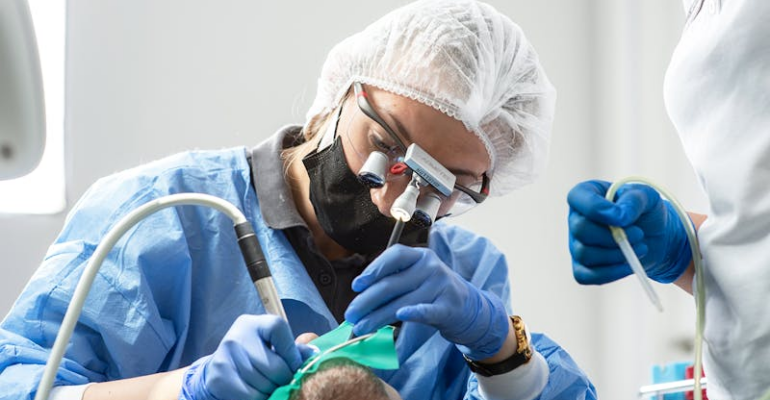What Does Torque Mean for Dental Implant Screws

What Does Torque Mean for Dental Implant Screws
Dental implant procedures have revolutionized modern dentistry, offering long-term solutions for missing teeth. One critical aspect of the success of dental implant screws is understanding the concept of torque. Torque plays a vital role in ensuring an implant’s stability, longevity, and overall success. But what does torque mean, and why is it important for dental implants?
Let’s dive into the details.
Understanding Torque in Dental Implant Screws
Torque refers to the rotational force applied to an object, such as a dental implant screw. In dental implantology, it is measured in Newton centimeters (Ncm) and is crucial for securing implants in place. Proper torque ensures that the implant screw is neither too loose nor overly tightened, both of which can lead to complications.
Why Is Torque Important?
- Prevents Loosening: Inadequate torque can cause implant screws to loosen over time, leading to instability.
- Avoids Over-Tightening: Excessive torque may damage the implant screw or surrounding bone.
- Ensures Proper Osseointegration: The right torque promotes successful bonding between the implant and the jawbone.
- Reduces Micro-Movements: Stabilization of the implant minimizes unwanted shifts that may interfere with healing.
Ideal Torque Values for Dental Implant Screws
Different implant systems require varying levels of torque. Below is a general guideline:
| Implant Component | Recommended Torque (Ncm) |
| Healing Abutments | 15–20 Ncm |
| Implant Abutment Screws | 30–35 Ncm |
| Prosthetic Screws | 20–30 Ncm |
Manufacturers often provide specific torque recommendations, so always follow the guidelines for the best outcomes.
Consequences of Incorrect Torque Application
Applying incorrect torque to dental implant screws can lead to serious complications. Here are some potential risks:
1. Under-Torquing: Risk of Loosening
If the implant screw is not tightened sufficiently:
- It may become loose over time.
- It can cause discomfort and improper loading.
- It may lead to implant failure.
2. Over-Torquing: Risk of Damage
Applying excessive torque can:
- Strip the implant screw threads.
- Damage to the surrounding bone, leading to implant failure.
- Cause microfractures in the jawbone, delaying healing.
How to Ensure Proper Torque in Dental Implant Screws
To achieve the correct torque, dental professionals follow these essential steps:
- Use a Torque-Controlled Driver
- A precision torque wrench or driver ensures the exact application of force.
- Follow Manufacturer Guidelines
- Each implant system has unique torque recommendations.
- Monitor Stability During Follow-Ups
- Regular check-ups help detect any loosening or complications early.
- Educate Patients on Post-Procedure Care
- Avoiding hard foods and maintaining good oral hygiene reduces the risk of implant failure.
The Role of Torque in Long-Term Implant Success
Correctly applied torque significantly contributes to the durability of dental implant screws. When the right force is used:
- The risk of implant failure decreases.
- The stability of the implant improves.
- The patient experiences better long-term results.
Common Myths About Torque in Dental Implant Screws
There are several misconceptions about torque and its role in dental implants. Let’s clear up a few:
Myth 1: Higher Torque Always Means Better Stability
- Excessive torque can lead to implant failure due to bone microfractures.
- Proper torque application is about balance, not maximum force.
Myth 2: Once Tightened, The Implant Screw Never Needs Adjustment
- Implants require periodic check-ups to ensure stability and function.
- Natural wear and tear may necessitate retightening or adjustments.
Myth 3: Any Torque Wrench Can Be Used
- Only dental-specific torque drivers should be used for implants.
- These tools are calibrated for precision to prevent over- or under-tightening.
How Patients Can Maintain Implant Stability
While the dentist ensures proper torque application, patients also play a role in maintaining implant longevity:
- Regular Dental Visits: Routine check-ups can detect any loosening early.
- Good Oral Hygiene: Brushing, flossing, and avoiding plaque buildup reduce infection risks.
- Avoid Hard Foods: Excessive force from chewing hard objects can disrupt implant stability.
- Report Any Issues Immediately: If an implant feels loose or uncomfortable, contact a dentist promptly.
Future Advances in Torque Application for Dental Implant Screws
Dental implant technology continues to evolve, with innovations aimed at improving precision and outcomes:
- Smart Torque Devices: Digital torque tools provide real-time data on force applications.
- Advanced Material Coatings: New coatings improve friction and stability while reducing the risk of loosening.
- AI-Powered Torque Calibration: Artificial intelligence helps determine the optimal torque for each patient’s specific needs.
The Relationship Between Bone Quality and Torque
Bone density and quality significantly influence the torque required for dental implants. Patients with softer bone structures may require modified torque values or additional procedures, such as bone grafting, to ensure implant success. Dentists must evaluate the patient’s bone quality before finalizing torque application.
How Bone Density Affects Torque
- High-Density Bone (Type I & II): Requires precise torque to prevent excessive pressure that could cause stress fractures.
- Medium-Density Bone (Type III): Generally the most favorable condition for achieving stability with standard torque values.
- Low-Density Bone (Type IV): Often requires lower torque settings and additional stability measures, such as wider implant designs or staged loading.
Summing it Up
Understanding the importance of torque in dental implant screws is essential for both dentists and patients. Proper torque application ensures stability, reduces complications, and promotes successful osseointegration. By following best practices and manufacturer guidelines, dental professionals can enhance the longevity and success rate of dental implants.
If you are considering a dental implant, consult a qualified dentist to ensure the procedure is done with precision and care. For detailed information and to schedule a consultation regarding dental implants, visit Ramlaoui, D.D.S. By focusing on proper torque application, we can ensure that dental implant screws continue to provide durable and effective tooth replacement solutions for years to come.

